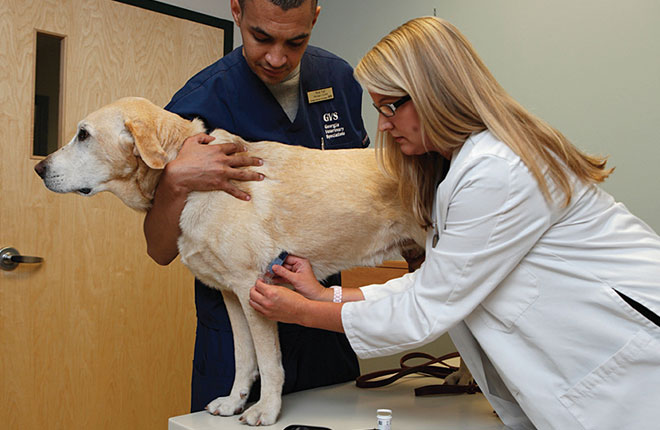Comprehending Your Animals' Nutritional Requirements for Optimal Health And Wellbeing

Value of Well Balanced Diets
Making certain a balanced diet regimen for pets is important for their total wellness and health. Pet dogs, like people, require a mix of healthy proteins, carbs, fats, minerals, and vitamins to maintain ideal health and wellness.
Including a variety of nutrients makes sure that pets keep a durable immune system, healthy and balanced skin, and a glossy layer. A balanced diet can prevent a host of health concerns such as excessive weight, which is connected to diabetes and joint issues, or poor nutrition, which can lead to developmental hold-ups and body organ dysfunction.
Pet dog proprietors need to be conscious of section dimensions and caloric intake, as overfeeding or underfeeding can have serious consequences. Consulting with veterinarians or pet dog nutritional experts can assist customize diet regimens to satisfy particular demands, making certain that family pets get the appropriate balance of nutrients necessary for their dimension, age, and activity level. A well balanced and regular diet regimen is crucial for a pet dog's durability and happiness.
Species-Specific Nutritional Demands
Just how do different varieties of family pets have differing nutritional requirements? This question highlights the need for a tailored approach to feeding our animal buddies. Each species has special metabolic pathways, gastrointestinal systems, and nutritional demands that should be fulfilled for ideal wellness. Pets are omnivores, requiring a balanced diet regimen of healthy proteins, fats, and carbohydrates, while pet cats, as obligate predators, need a greater protein intake derived primarily from animal sources.
Birds, depending upon their varieties, may need a diet plan abundant in pests, fruits, or seeds, highlighting the diversity within the avian world. Pets. Reptiles, such as serpents and turtles, in a similar way need species-specific diet regimens, with some requiring high degrees of calcium and others, a well-calibrated equilibrium of pests and plant matter
Comprehending the dietary distinctions amongst different types is important for family pet proprietors. By acknowledging and providing to these differences, we make sure the provision of appropriate nutrition, supporting the total well-being and vitality of our animals.
Age and Size Considerations
While species-specific nutritional requirements lay the foundation for a family pet's size, age and diet regimen further fine-tune these demands. Young animals, such as kittens and young puppies, require diet regimens rich in calories, healthy proteins, and crucial nutrients to sustain fast development and advancement. These young animals have greater metabolic prices and call for more constant feedings to sustain their power degrees and make certain appropriate advancement of bones, muscular tissues, and organs.
Formulas created for adult pets frequently focus on maintaining weight, promoting gastrointestinal health, and sustaining an active way this hyperlink of living. Alternatively, senior family pets may benefit from specialized diet regimens that deal with age-related challenges, such as joint wellness, cognitive feature, and organ assistance.

Health Conditions and Dietary Adjustments
Specific health and wellness conditions can dramatically influence the nutritional demands of pet dogs, demanding tailored dietary modifications to support their wellness. For circumstances, pet dogs with diabetes mellitus might take advantage of diet plans that are high in fiber and reduced in easy carbohydrates to help regulate blood glucose levels. Overweight pets commonly need reduced-calorie diet regimens to promote weight loss and stop involved health and wellness complications.
Animals with kidney condition might require diet plans low in phosphorus and healthy protein to relieve kidney workload. Omega-3 fats, known for their anti-inflammatory buildings, can be advantageous for pets experiencing problems like joint inflammation or inflammatory digestive tract disease. In addition, animals with food allergies or intolerances might need hypoallergenic diet regimens, typically needing a process of removal to identify and omit upseting components.
Vet support is crucial when making nutritional modifications, as incorrect nourishment can exacerbate existing health and wellness issues or lead to brand-new ones. Routine surveillance and changes based on the family pet's response to nutritional adjustments are necessary. A well balanced strategy, taking into consideration both dietary and medical needs, guarantees that dietary interventions contribute favorably to anchor managing health and wellness conditions, improving not only the pet's health but also their quality of life.
Tips for Finding High Quality Pet Food
Picking the best pet food is essential for ensuring your pet's health and long life. A well balanced diet supports their body immune system, maintains healthy and balanced weight and promotes overall vigor. Begin by consulting your veterinarian to recognize your animal's specific nutritional needs based upon age, wellness, and breed condition.
When evaluating family pet food, scrutinize the active ingredient checklist. Top notch animal foods usually detail actual meat, poultry, or fish as the key component. Prevent items with too much fillers like corn, soy, or by-products that use minimal dietary worth. Try to find all-natural chemicals and well-known components instead than man-made ones.
Look For the Association of American Feed Control Officials (AAFCO) statement on the product packaging. This suggests the food fulfills well established dietary criteria. Additionally, research the supplier's online reputation. Brand names with a background of recalls or low quality control must check this be come close to with caution.
Think about whether your animal would take advantage of unique formulations such as grain-free, high-protein, or limited-ingredient diet plans. These can be useful for pets with allergic reactions or certain health and wellness concerns. Observe your animal's response to the food. Monitor their layer problem, power degrees, and food digestion to guarantee the diet works.
Conclusion
A detailed understanding of pet dogs' nutritional requirements is essential for promoting their ideal wellness. By adhering to these principles, pet owners can considerably add to their pets' development, power levels, and general health and wellness, fostering a happier and much healthier life.

Choosing the appropriate pet dog food is essential for guaranteeing your family pet's wellness and durability. By adhering to these concepts, family pet owners can considerably add to their animals' development, power degrees, and overall wellness, fostering a happier and healthier life.
Comments on “Comprehending the Special Needs of Various Kinds Of Pets”